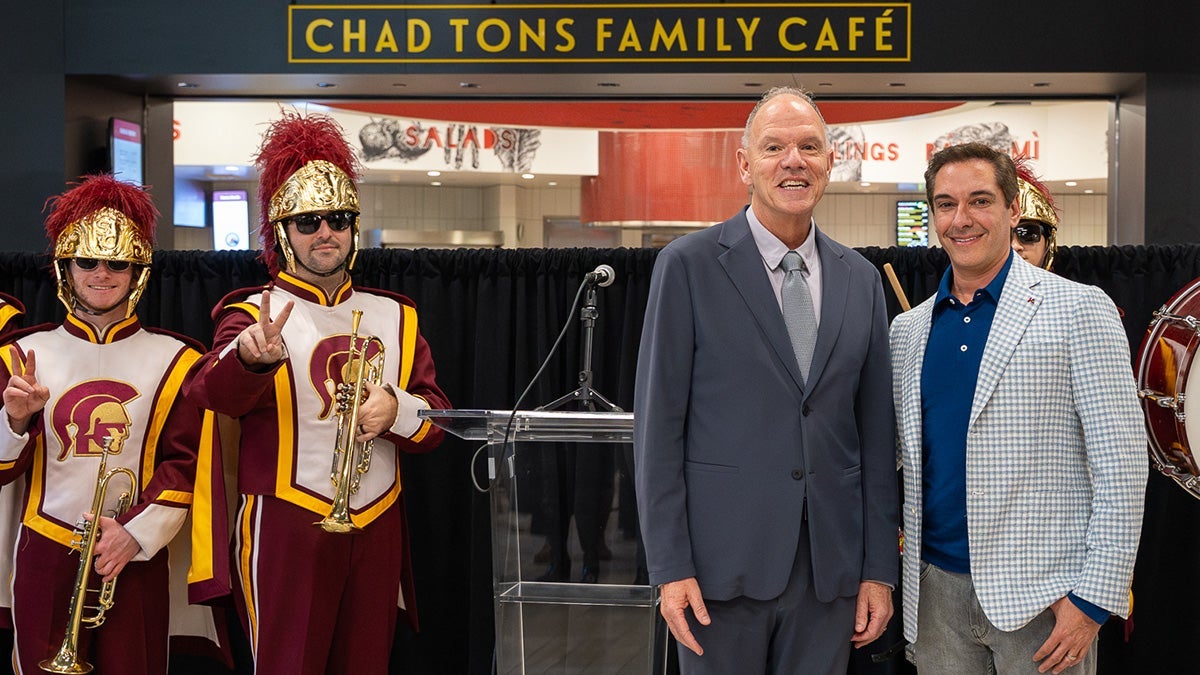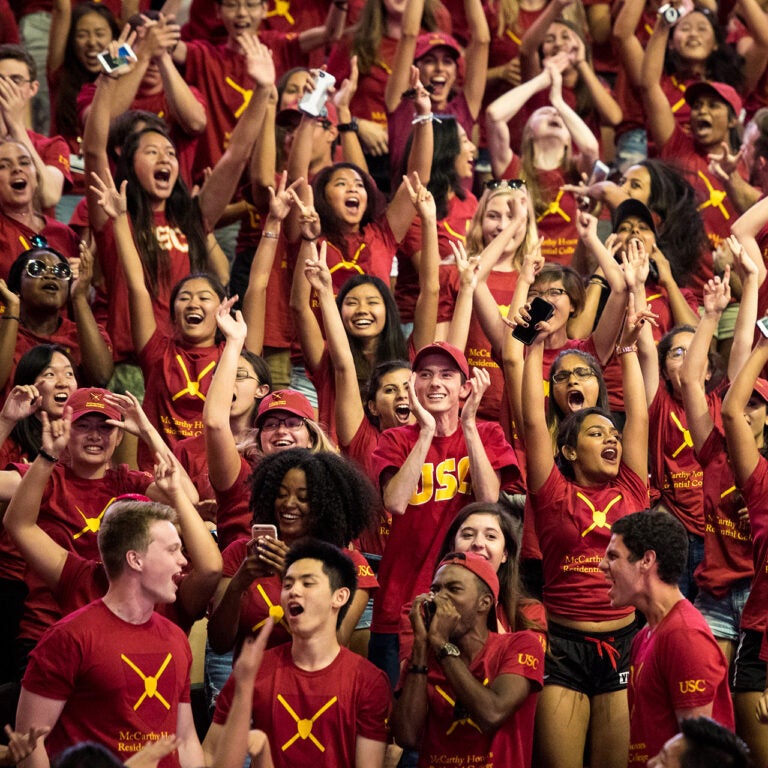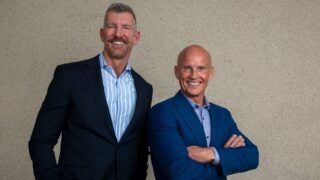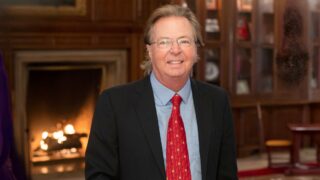
University
AI and higher ed: USC’s ’big tent’ approach to artificial intelligence
USC Marshall Dean Geoffrey Garrett talks about the university president’s AI Strategy Committee and leading university-wide efforts to integrate AI ethically and responsibly across all disciplines.
As artificial intelligence transforms every sector of society, USC is taking the lead in shaping the AI revolution in higher education with two initiatives recently announced by USC Interim President Beong-Soo Kim.
In October, Kim launched the “President’s AI Strategy Committee,” and on Tuesday, the university will host its inaugural AI Summit, signaling USC’s commitment to preparing students not only to use AI tools but also to understand their profound societal implications.
The 15-person committee, led by Dean Geoffrey Garrett of the USC Marshall School of Business, brings together deans, senior administrators and faculty from across disciplines to ensure that USC’s approach serves the entire university community, not just advanced computing specialists.

USC News spoke with Garrett about the committee’s philosophy, its ambitious goals for student engagement, and how USC plans to lead responsibly in what he calls “a revolution for higher education.”
How is the committee approaching AI at USC?
Garrett: You can think about AI in two ways. One is to start with the core computing side, get under the technical hood, and then figure out what the uses might be. But there’s an equally valid perspective: Start with domain expertise and disciplinary perspectives and then explore how to use AI tool to further your goals in them.
Not everybody needs to be a producer of AI. But everyone needs to be an effective and responsible user. That immediately expands the use case for AI to the whole university, including people who are skeptical of AI and disciplines that feel far afield. Our idea is to go university-wide, not just to double down on advanced computing — even though USC School of Advanced Computing Director Gaurav Sukhatme is a great contributor to our committee.
Who serves on the committee?
Garrett: There are really three kinds of people on the committee, and it’s roughly one-third, one-third, one-third. President Kim, not only in AI, but more generally, wanted to work more closely with the deans. That means in the key decision making and leadership teams for the university – including the AI committee. That’s the first group.
The second group is senior university administrators, who you really need to have if you’re going to get things done. We have Ishwar K. Puri, senior vice president for research and innovation, who handles research and innovation; Andy Stott, vice provost for academic programs, who oversees education; Shri Narayanan, vice president for presidential initiatives, who leads all global initiatives and is an AI expert himself; and Provost Andrew T. Guzman, who now attends all the meetings. If you want to move the university, you need their support.
The third group — roughly one-third of the committee — is faculty who are really into AI, but from very different perspectives, from hardcore computing true believers to more evaluative approaches from the liberal arts.
So far, the committee has been remarkably effective. Even though people are coming from completely different perspectives, we all agree on what the big tent approach should be and how we’re going to make real progress quickly. It is so energizing and inspiring to be part of a group of leaders with very different perspectives who are united by common aspirations and shared enthusiasm for what we might achieve.
What is the committee’s remit?
Garrett: While there is lots of incredible AI research throughout USC that we should celebrate — not just in computing, but in the arts and humanities, the health sciences, and all the professions — we want our committee to be focused more on the question of how we should best position USC education, for all our students, for the age of AI.
There’s an area between education and administration — things like student admissions, advising and careers — where there’s a very good argument for using AI tools to handle all the rote questions that students ask about curriculum or internships so that people like careers professionals can work with students in more personalized ways. We’ll certainly support that, but we won’t focus on it.
Our core goal is to transform undergraduate education throughout USC by giving all our students opportunities to take classes and do experiential learning related to AI. We would like to develop courses in all USC schools on what AI means for our disciplines. We want all our students to develop the skills to be responsible and ethical users of AI. We’d love to expand opportunities for students to do project-based learning with AI companies.
One of our goals is to develop an AI assistant that will be available to every USC student. We’re considering doing that as a hackathon: Have students pitch their ideas, then have students vote on which ones they like, and then use the power of the university to develop and implement the tools.
How are you engaging the USC community?
Garrett: The best piece of advice I have received about implementing AI initiatives on university campuses is that it’s less about technology than winning the hearts and minds campaign for change — in the case of AI, radical if not revolutionary change. There are numerous reasons to be skeptical, so if you’re going to win hearts and minds.
We’ve been considering various methods of engagement that are much more than listening sessions. One is the summit. The second is the best practice teaching workshops that USC’s Center for Excellence in Teaching is putting on Nov. 13. And the third is a student hackathon on an AI assistant, scheduled for the winter.
What can we expect at the AI Summit?
Garrett: The summit has three components. First, we’re really pleased that Eric Schmidt, the former CEO of Google and a real thought leader in AI, is going to have a conversation with President Kim about what the AI world looks like and what it means for higher education.
Second, we sent out a request for proposals to the whole USC community: Tell us what you’re doing in AI, and whether you’d like to be on stage to talk about it? We sent that to faculty, staff and students, and we got literally hundreds of responses, which was fantastic.
We’ve narrowed it down to a series of short presentations — 10 minutes each — covering the whole university. In terms of disciplinary backgrounds, we’ve got everything from the hardest hard sciences to the humanities, engineering and business. I’m also really pleased that our presenters will not only be faculty, but also staff and students.
Finally, I will have a conversation with Leah Belsky, the head of education at OpenAI, about her approach to higher education and opportunities for USC to partner with OpenAI to empower all members of our community to leverage the myriad possibilities of AI.
How are you thinking about responsible AI?
Garrett: We have an obligation to make sure that everyone in our community can be a super user of the technology. Not everybody has to be a producer, but everybody should be a user.
But let’s also be thoughtful, responsible, ethical users. I think “ethical” is a bit narrow. I like “responsible” better because it’s broader. We need to acknowledge the profound societal disruption of AI. What we’re really saying to our students is: We want you to be super users, but we also want you to be responsible users, because how you use AI is going to affect not only your lives, but because you are all leaders, all of society too.
How do we promote critical thinking and other essential human skills in an AI environment? I was at a brunch recently where I was talking with someone in Hollywood about how people in the entertainment industry are using AI. Everyone is using AI to improve the quality of scripts, ideas, whiteboarding — they’re all doing that because the productivity increase is massive. But the challenge will be: What does original work mean in an AI age? What’s original work for students? What’s original work for faculty? What’s original work for people in the entertainment industry? What’s going to happen to copyright? These are profound questions we need to address. That’s why I think we must balance empowering students to be superusers of AI with ensuring that they are also responsible leaders in the AI age.
What’s the opportunity for USC?
Garrett: There are lots of big questions about AI right now: Is AI all hype? Is there an investment bubble? Is AI going to lead to massive employment disruption? What is artificial general intelligence and do we want it? These are all real questions that we should all think deeply about and debate openly.
But for me, there is a simple bottom line on campus. I believe AI will be a revolution for higher education. And I want USC to be in the vanguard of that revolution.



